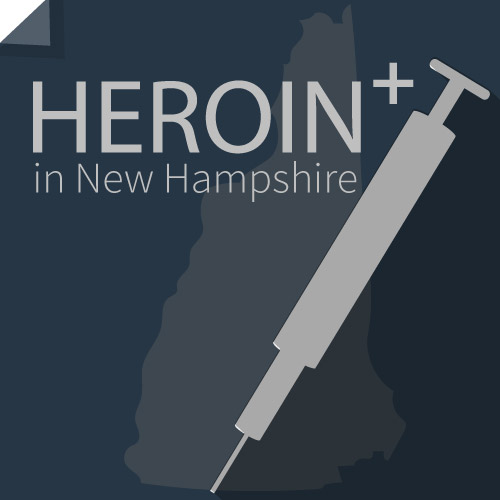 In 2014, more than 300 people in New Hampshire died from drug overdoses due, in part, to a spike in heroin use. Last month, the White House announced the allocation of $2.5 million to address the heroin problem in the Northeast, and in September, Gov. Maggie Hassan called for stronger opioid prescription rules.
In 2014, more than 300 people in New Hampshire died from drug overdoses due, in part, to a spike in heroin use. Last month, the White House announced the allocation of $2.5 million to address the heroin problem in the Northeast, and in September, Gov. Maggie Hassan called for stronger opioid prescription rules.
In this series, UNH Today takes a look at how UNH alumni, faculty and students are tackling the issues of prevention, treatment and regulation here in the Granite State.
In some instances, a 40-50 percent success rate wouldn’t be considered that great, but Alex Casale will take those numbers any day of the week. First, because it means the drug court program in Strafford County that he oversees is working. And second, it tells him they are serving the right population.
“Fifty, even 40 percent is really, really good because we’re taking in the worst of the worst in both risk and need,” Casale says. “We have people in the program who have 15, 20 convictions on their record. That means other options have failed for them. If we had an 80 percent success rate that would tell me we’re taking in the wrong population — people who could likely make it on their own.”

Casale ’03 is director of the Strafford County drug court program and state coordinator for New Hampshire drug courts in Rockingham, Grafton, Cheshire and Hillsborough counties and the Laconia District Court. The Strafford County program was the first in the state, opening in 2006 after a 14-month pilot run.
“Detox and inpatient treatment success rates are probably about the same but there are few places left in New Hampshire,” Casale says. New Hampshire is second to last in the country when it comes to getting treatment for drugs and alcohol. People in need of inpatient care or detox can spend months waiting for a bed. “The re-arrest rate three years out for those who don’t enter the drug court program is anywhere from 60 to 70 percent. That’s staggering compared to those who go through drug court.”
How Drug Courts Work
Drug courts keep individuals in treatment long enough for it to work, while supervising them closely. For a minimum term of one year, participants are:
- provided with intensive treatment and other services they require to get and stay sober;
- held accountable by the drug court judge for meeting their obligations to the court, society, themselves and their families;
- regularly and randomly tested for drug use;
- required to appear in court frequently so that the judge may review their progress; and
- rewarded for doing well or sanctioned when they do not live up to their obligations.
Drug courts target the most chronic users and offenders — those who appear in court again and again on the same charges. Those for whom other attempts at recovery have failed. Faced with the prospect of going to jail or sticking to the 12-month program, many people make it stick.
The plan provides intensive outpatient drug and/or alcohol treatment that helps offenders learn to live soberly through weekly counseling sessions, strict court supervision and random drug testing that can occur multiple times a week.
The best time to bring people into the program is immediately following an offense — an arrest or overdose, for example, Casale says. If they don’t opt for the drug court program, it could be 30-45 days before they go to court, a timespan that may be too porous to foster success.
“Their motivation is going to be greatest right at the time of crisis,” Casale says, adding, “People can fail multiple times before they finally get it. The way I see it is, you never know when someone is ready to change so let’s give them a chance.”
That chance is made more critical given the rise in heroin overdoses and deaths that have occurred during the last few years. According to the U.S. Centers for Disease Control and Prevention, deaths from heroin overdoses nearly quadrupled between 2002 and 2013. What’s more, its use has increased most among groups where it once was low: women, people with higher incomes and those with private insurance.
The spike in heroin use is not surprising, Casale says, given the spotlight on prescription drug abuse of such painkillers as OxyContin. (The National Institute on Drug Abuse reports the number of prescriptions for hydrocodone and oxycodone skyrocketed worldwide from around 76 million in 1991 to more than 200 million in 2013, with the United States accounting for almost 100 percent of the total for hydrocodone and 81 percent for oxycodone.)
“Five years ago, people were robbing pharmacies to get OxyContin. Then, the formula was changed, there was a crackdown among doctors on the number of prescriptions that were being written, and pharmacies changed their policies and kept less OxyContin on-site, making it harder to get and driving the price up,” Casale says. “Heroin is cheaper and easier to get. If the supply starts to decrease, demand will swing to another drug.”

Read more about Alex Casale and other UNH alumni who are working within the Strafford County criminal justice system in Guiding the Climb: In the Strafford County Corrections System, UNH Alums Serve up Justice with a Healthy Side of Compassion.
Which reinforces the need to address addiction itself, he says, adding that prevention is less costly than treatment. The rub lies in how to have prevention measures come first, before someone becomes addicted, which requires resources.
“But even with more money, there would still be failures,” Casale says. “Until we address addiction through prevention, treatment and recovery support services, and address the issue of how to get people not to use, the addiction is just going to shift. Ten years ago cocaine was the primary drug of choice in Strafford County. Now it’s opiates.”
At UNH, Casale majored in psychology and minored in justice studies and philosophy. During his senior year he did an internship at the Strafford County Court House and then was offered a part-time job contingent on receipt of a grant. When it didn’t come through, Casale decided to continue the internship on his own, without pay, for six more months so he would have a year's worth of experience on his resume. In 2005, he was hired full time as a drug court case manager. He has been the program director since 2008, is on the board of the New England Association of Drug Courts and is a consultant for American University in Washington, D.C.
-
Written By:
Jody Record ’95 | Communications and Public Affairs | jody.record@unh.edu
















































